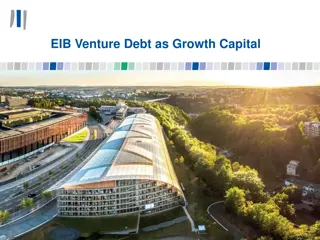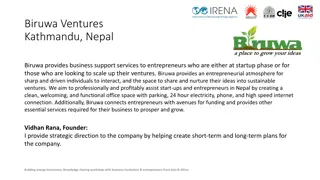Understanding Venture Capital and Joint Ventures in Entrepreneurship
Venture capital plays a crucial role in providing funding to companies and entrepreneurs, especially those in the early stages of development. It involves long-term equity investments with active management participation, focusing on high-risk ventures with growth potential. This form of financing is essential for startups and small businesses to scale up and achieve long-term success.
Download Presentation

Please find below an Image/Link to download the presentation.
The content on the website is provided AS IS for your information and personal use only. It may not be sold, licensed, or shared on other websites without obtaining consent from the author. Download presentation by click this link. If you encounter any issues during the download, it is possible that the publisher has removed the file from their server.
E N D
Presentation Transcript
Introduction to Venture Capital and Joint Venture ENTREPRENEURSHIP DEVELOPMENT AND INDUSTRIAL CONSULTANCY (DBM-421) A K JHA
Venture Capital Entrepreneurs need funds to realize their endeavour Venture capital financing is funding provided to companies and entrepreneurs Venture capital is an important source of financing small scale enterprise and high technology and risky ventures. It is often thought of as the early stage financing of new and young enterprises seeking to grow rapidly. In this mode there is involvement of venture capitalist in the management of entrepreneurs unit. Traditional finances generally provide financial support to the established and proved technology areas only whereas venture capitalist provides financial support to high and new technology based units. In broad terms, Venture capital is the investment of long term equity finance where the venture capitalist receives his return generally in the form of capital gains. Under this mode, venture capital financer and entrepreneur work together as partners for the benefit of enterprise. The venture capitalist focuses on growth and wants to see small businesses grow in to larger ones.
Venture Capital Venture capital is a form of private equity and a type of financing that investors provide to start-up companies and small businesses that are believed to have long-term growth potential. Venture capital funds are investment funds that manage the money of investors who seek private equity stakes in start-up and small & medium enterprises with strong growth potential. These investments generally involve characterized as high- risk/high-return opportunities Venture Capitalist in India are an essential part of start-up ecosystem. Once a start-up has reached it s growth stage, it s most important requirement is undoubtedly the backing by reliable investors and an ample amount of funding to scale up.
Characteristics of venture financing Equity participation It is actual or potential equity participation through direct purchase of shares, options or convertible securities with objectives of making capital gains by selling off the investment when the unit becomes profitable. Long term investment Time period of investment varies from 5 to 10 years. Managerial participation There is active involvement of venture capitalist in the enterprise. By providing necessary management skills viz., planning, organizing, controlling, leading and functions like finance, marketing etc.
Stages in Venture Capital Financing There are five stages in venture capital financing: 1. Seed Stage At the seed stage, the company is only an idea for a product or service, and the entrepreneur must convince the venture capitalist that their idea is a viable investment opportunity. If the business shows potential for growth, the investor will provide funding to finance early product or service development, market research, business plan development, and setting up a management team. Seed- stage venture capitalists participate in other investment rounds alongside other investors.
Stages in Venture Capital Financing 2. Start-up Stage The start-up stage requires a significant cash infusion to help in advertising and marketing of new products or services to new customers. At this stage, the company has completed market research, has a business plan in place, and a prototype of their products to show investors. The company brings in other investors at this stage to provide additional financing. 3. First Stage The company is now ready to go into actual manufacturing and sales, and this requires a higher amount of capital than the previous stages. Most first-stage businesses are generally young and have a commercially viable product or service.
Stages in Venture Capital Financing 4. Expansion Stage The business has already started selling its products or services and needs additional capital to support the demand. It requires this funding to support market expansion or start another line of business. The funding may also be used for product improvement and plant expansion. 5. Bridge Stage The bridge stage represents the transition to a public company. The business has reached maturity, and it requires financing to support acquisitions, mergers, and IPOs. The venture capitalist can exit the company at this stage, sell off his shares, and earn a huge return on his investments in the company. The exit of the venture capitalist allows other investors to come in, hoping to gain from the IPO.
Structure of a Venture Capital Firm A venture capital firm is structured in the form of a partnership, where the venture capital firm serves as the general partners and the investors as the limited partners. The limited partners may include insurance companies, wealthy persons, pension funds, university endowment funds, and foundations. All the partners have an ownership stake in the venture firm fund, but the general managers serve as the managers and investment advisors to the companies invested in. The profits from the investment of the venture capital firm are split between the general partners and limited partners
Joint Ventures A joint venture is a contractual business under taking involving equity based single business activity. Joint ventures can be set up either in company's own territory or in a new territory generally in a developing country. Joint ventures are formed by the parties entering into an agreement. The agreement specifies the mutual responsibility and goal of contracting parties. The joint venture partners can generate the capital of the joint venture by injecting either cash alone or cash together with assets like technology, land and building. In joint ventures the operational details, rights and duties of contracting parties are clearly specified in written form to be helpful in legal controversy. A joint venture can be terminated at specified time in the contract or upon death of active partner or on basis of any court decision arrived at to solve any dispute.
Important Clauses of Joint Venture Agreement 1. The proportion of shareholding in the joint venture company 2. Specify nature of shares, indicate their transferability conditions. 3. Composition of the board of directors, appointment of chairman, quorum of board meetings, casting vote provisions. 4. General meeting 5. Appointment of CEO/MD. 6. Appointment of management committee. 7. Important decisions with mutual consent of partners. 8. Dividend policy 9. Funding provision 10. Change of control/exit clause
Important Clauses of Joint Venture Agreement 11. Anti-compete clauses 12. Access condition 13. Maintaining confidentiality 14. Indemnity clauses 15. Assignment 16. Break of Deadlock 17. Dispute resolution 18. Applicable law 19. Force Majeure 20. Termination provisions























